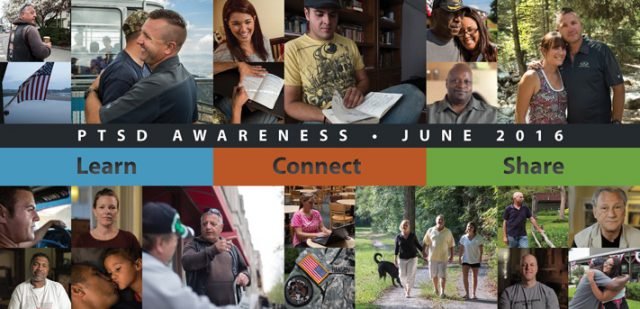
Courtesy of the USAG Stuttgart Equal Opportunity Office
Excerpt www.ptsd.va.gov
After a trauma or life-threatening event, it is common to have reactions such as upsetting memories of the event, increased jumpiness, or trouble sleeping. If these reactions do not go away or if they get worse, you may have Posttraumatic Stress Disorder (PTSD).
Help raise awareness of PTSD and effective PTSD treatment and recovery.
Meet Gina: Gina had a great job, a loving husband, and a beautiful home. But she was miserable. Some days, a kiss from her hus-band would make her heart start pounding, and she would feel very afraid. She did not realize that these panicky feelings were flash-backs-the re-experiencing of the feelings that she had felt when she was a small child and couldn’t protect herself.
Gina sought help. She went to a therapist, and finally revealed that her uncle had repeatedly sexually abused her as a child. Her therapist diagnosed PTSD, and started cognitive behavioral therapy with Gina. Therapy taught her to challenge her thoughts and feel less stress. She still has occasional flash-backs and panic attacks, but they’re now controllable, and she knows they will pass. Be-fore, she thought she’d always have to live with the flashbacks and bad feelings. Now, she can go weeks without thinking about the abuse, and she feels certain that someday it will be years.
Meet Frank: Frank served our country in Vietnam. Before the war, he had been a happy person, but he rarely smiled once he cam home. For many years, Frank didn’t talk about Vietnam, thinking he would spare people. He started drinking more. He had a short temper, and had to have his back to the wall in restaurants because he kept thinking some-one was after him. He couldn’t hold a job or have a successful relationship. He just felt something was wrong. Frank didn’t realize it, but he was having symptoms of PTSD. “It was nice to know there was a reason for what I was doing.” Frank went to the VA, where he was diagnosed with PTSD and given treatment and support. He’s doing much better now. “I would definitely recommend any Veteran go and get help.”
People with PTSD may develop some of the limitations discussed below, but seldom develop all of them. Also, the degree of limitation will vary among individuals. Be aware that not all people with PTSD will need accommodations to perform their jobs and many others may only need a few accommodations. The following is only a sample of the possibilities available. Numerous other accommodation solutions may exist.
Questions to consider:
1. What limitations is the employee with PTSD experiencing?
2. How do these limitations affect the employee and the employee’s job performance?
3. What specific job tasks are problematic as a result of these limitations?
4. What accommodations are available to reduce or eliminate these problems? Are all possible resources being used to determine possible accommodations?
5. Has the employee with PTSD been consulted regarding possible accommodations?
6. Once accommodations are in place, would it be useful to meet with the employee with PTSD to evaluate effectiveness of the accommodations and to determine whether additional accommodations are needed?
7. Do supervisory personnel and employees need training regarding PTSD?
Accommodation Ideas:
Memory:
-Provide written instructions
-Post written instructions for use of equipment
-Use a wall calendar
-Use a daily or weekly task list
-Provide verbal prompts and reminders
-Use electronic organizers or hand held devices
-Allow employee to tape record meetings
-Provide written minutes of each meeting
-Allow additional training time
Lack of Concentration:
-Reduce distractions in the work environment
-Provide space enclosures or a private space
-Allow for the use of white noise or environmental sound machines
-Allow the employee to play soothing mu-sic using a cassette player and a headset
-Increase natural lighting or increase full spectrum lighting
-Divide large assignments into small goal oriented tasks or steps
-Plan for uninterrupted work time
Time Management/Performing or Completing Tasks:
-Make daily TO-DO lists and check items off as they are completed
-Divide large assignments into smaller tasks and steps
-Schedule weekly meetings with supervisor, manager, or mentor to determine if goals are being met
-Remind employee of important deadlines via memos or e-mail
June is Posttraumatic Stress Disorder (PTSD) Awareness Month
The National Center for PTSD promotes awareness of PTSD and effective treatments throughout the year. Starting in 2010, Congress named June 27th PTSD Awareness Day (S. Res. 455). In June 2014, the Senate designated the full month of June for National PTSD Awareness (S. Res. 481).
Following trauma, most people experience stress reactions but many do not develop PTSD. Mental health experts are not sure why some people develop PTSD and others do not. However, if stress reactions do not improve over time and they disrupt everyday life, seeking help to determine if PTSD is a factor is important.
The purpose of PTSD Awareness Month is to encourage everyone to raise public awareness of PTSD and its effective treatments. The Veterans Administration (VA) can help those veterans affected by PTSD.
